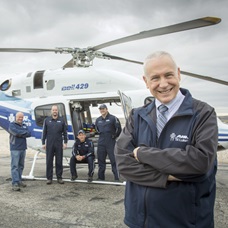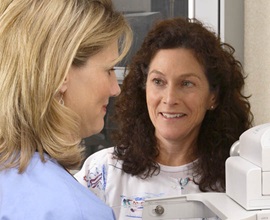Dr. Pate’s Prescription for Change
Blue Cross of Idaho President Charlene Maher’s Inspired Decision Inspires Others

Charlene Maher, president and chief executive officer of Blue Cross of Idaho, has a very important message for all women: Get a screening mammogram. I’d second that, and invite all men to encourage the women in their lives to do so.
Charlene has been gracious and brave in sharing her own story of how early screening may have saved her life, in the hopes that it might save others. Please read her message, and share it with your mother, sister, aunts, co-workers, social network and all the women in your life who are important to you.
- David C. Pate, M.D., J.D.

It is amazing how a small, random decision can change the course of your life.
For me, it was the seemingly offhand choice to get a mammogram when St. Luke’s mobile mammography coach made one of its regular visits to Blue Cross of Idaho’s headquarters.
I was not due for a screening. In fact, before I came to Idaho my doctor had suggested I move to an every-three-year screening schedule since I had no family or personal history of breast cancer.
But because I am in health care, I felt it was important to set a good example. I also thought it would be a baseline scan for future comparison.
The choice may have saved my life.
I had no reason, no risk, no symptoms – and I had Stage 2 breast cancer.
Beyond the shock of the diagnosis, there was good news. Because my cancer was caught relatively early, my prognosis is excellent. My doctor feels I have every reason to be optimistic, and my treatment is going well.
Still, it is hard not to consider what might have happened if I did not have that mammogram. It would have been another year before I was screened, and by then the cancer would have been much worse.
I know that I am more than fortunate. Life has handed me an opportunity.
At first, I was hesitant to share my diagnosis. I am a private person, and there are few things as deeply personal as your health.
But because of the impact of my treatment on my daily life, I am being up-front about my situation. What I did not expect was the impact simply speaking up would have on other women around me.
Nearly every day, Blue Cross of Idaho employees stop me to say that they have scheduled their own mammogram screenings because I have shared my situation. I am a face they can put on the very sobering statistics. According to the American Cancer Society, one in eight American women will be diagnosed with breast cancer during her lifetime. When you personally know one of those diagnosed with the disease, it can suddenly feel very, very real.
And if sharing my story can motivate even one woman who hadn’t been planning to get a mammogram to take that step, I’m glad to do so.
Early detection is the most powerful tool we have in fighting this disease. Between 1989 and 2015, the rate of deaths from breast cancer decreased 39 percent, which experts attribute to an increased number of early screenings, better awareness and improved treatments.
It can be easy to push all of this to the back of our minds, gambling that we will not be that “one” out of the eight. But we cannot ignore the fact that early detection is not only available, but is easy to access. Whether it is in the form of a mobile screening van or in your care provider’s office, mammography screenings are possible for most of us.
Mammograms also are a fully covered preventive screening under the vast majority of insurance plans, so getting screened will likely come at no cost to patients.
The possibility of finding something during a mammogram is scary, but it is not as scary as realizing you could have found and treated breast cancer far sooner.
I will forever be thankful I decided to get screened. That single decision gave me the opportunity to continue making decisions for a long time to come.
About The Author

Charlene Maher is the president and chief executive officer of Blue Cross of Idaho.


